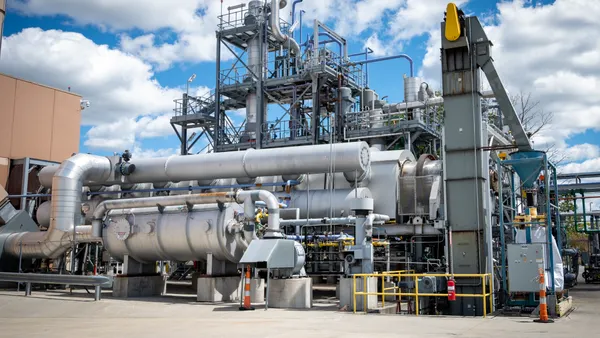Dive Brief:
- British chain Costa Coffee announced Wednesday its plan to recycle up to 500 million coffee cups annually by 2020. The company says that number is equivalent to its annual sales of takeaway cups.
- Costa will pay waste haulers £70 ($99.50) for each metric ton of cups the hauler collects. The company says this increases the price of a bale of cups by 140%. Wednesday's announcement is in partnership with five haulers in the U.K.: Veolia, Biffa, Suez, Grundon and First Mile.
- Three mills — James Cropper, ACE UK and DS Smith — are currently equipped to recycle coffee cups in the U.K., according to Costa, with a combined capacity of over 4.5 billion cups annually. Costa will also pay £5 per metric ton of cups to ValPak, which will audit the system and report recycling rates.
Dive Insight:
The U.K. lately has been taking several steps toward reducing waste and boosting recycling. Starbucks, for example, is exploring a £0.05 charge for disposable cups at some of its London stores, and other coffee chains have tried different recycling initiatives. Prime Minister Theresa May is pledging to eliminate avoidable plastic within 25 years and her government is exploring a £0.25 "latte levy" on disposable cups.
Separately, Starbucks announced in March it is giving $10 million to research on recyclable and compostable cups. Dunkin' Donuts, one of its main competitors, is promising to cease use of its polystyrene foam cups by 2020. Other companies, like McDonald's and Chipotle Mexican Grill, are taking similar steps to reduce their waste and increase recycling options for packaging.
What's unique about Costa Coffee is that, by subsidizing collected tons of coffee cups, it is implementing a form of voluntary extended producer responsibility (EPR). "We truly believe that producer-contribution schemes have the potential to transform the long-term sustainability outlook for the U.K.," David Palmer-Jones, CEO of Suez recycling and recovery UK, said in a statement.
EPR is, to say the least, controversial in the U.S. — though structures already exist for certain material streams, like tires, in some states. While some states have considered EPR for things like packaging, the idea has not gained much ground.









